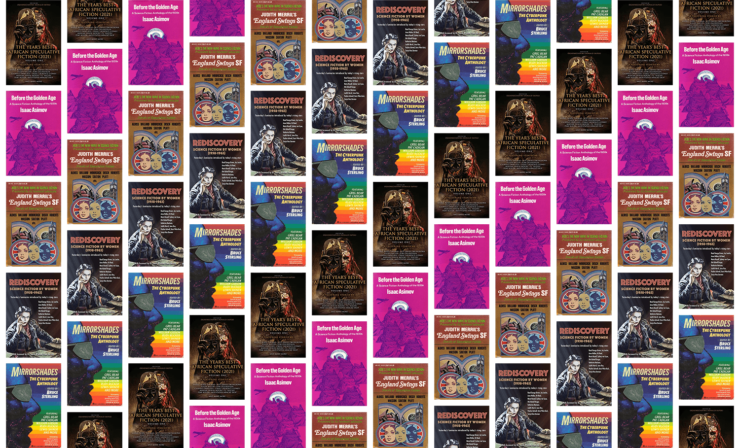Recently there has been some discussion as to whether reprint anthologies should have the same standing as fiction anthologies made up of entirely original stories. The argument seems to hinge on the notion that only the original acquisition requires editorial insight. However, consider this: reprint anthologies can and have served to document the rise of genres heretofore unnoticed. They can provide a historical perspective that editors in the present moment may not recognize or appreciate. Seeing worth in specific works is a valuable skill, but so is recognizing their value in a larger historical context.
Perhaps some examples are in order.
Before the Golden Age edited by Isaac Asimov (1974)
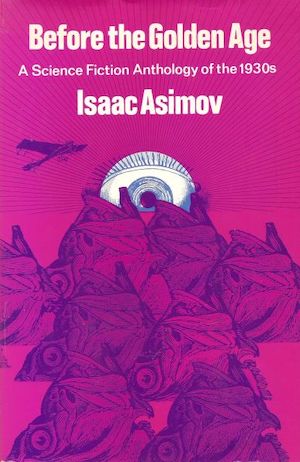
Before the Golden Age may be the least literary of my five examples, focusing as it does on stories dear to a teenage Isaac Asimov, stories from an era when exuberance was more valued by writers and readers than, oh, prose, sensible plotting, and scientific verisimilitude. Indeed, a number of the stories are what experts would term “appalling.”
However, this anthology has a number of positive qualities that recommend it. First, the anthology is 986 pages long: it will keep you busy for a while. Second, Asimov is not shy about commenting on the flaws of his old favourites (flaws as seen from the perspective of the 1970s). Third, the ancillary material contains diverting observations concerning the early history of science fiction. Fourth and finally, the ancillary material provides a significant amount of autobiographical information about Asimov himself, which may have inspired him to go on to write his massive two-volume autobiography later in the decade.
England Swings SF edited by Judith Merril (1968)
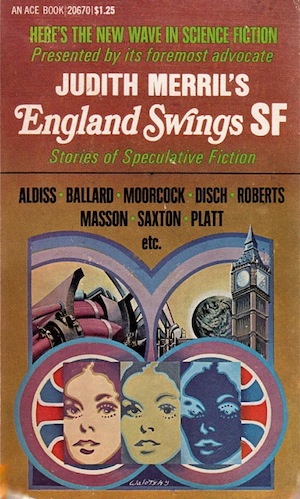
Ah, the New Wave (unrelated, as far as I know, to the musical genre of the same name). Science Fiction’s New Wave was ambitious, rejecting pulp conventions while embracing experimental styles and interiority, while also importing—sometimes to the great distress of the field’s grognards—concepts and approaches more common in mainstream literature. At the time, the SF community was divided on whether or not the New Wave was a good thing; I myself hold the only correct view on this issue, which I would expound at length were it not for pesky word count restrictions.
If one were British, persons interested in the British New Wave could peruse the pages of the periodical New Worlds. If one were American… well, British magazines were not always easy to come by. Enter noted anthologist Judith Merril. England Swings SF is a dense, 406-page exploration of the British New Wave, drawn from a variety of sources (as one would expect from Merril’s Year’s Best SF anthologies). For anyone curious about the New Wave, England Swings SF was the authority to which one could turn.
Mirrorshades: The Cyberpunk Anthology edited by Bruce Sterling (1986)

A generation after New Wave’s tide ebbed, cyberpunk took its own run at genre conventions. While cyberpunk was as fascinated by technology as was older science fiction, beneath its slick surfaces it offered a decidedly less optimistic perspective. Protagonists were often criminals or losers; the societies around them were dystopias disinclined to accommodate the unconventional. Plots often explored the illicit purposes for which ingenious scallywags or vast impersonal corporations might employ new technology.
One can, of course explore nascent genres by simply snapping up all the new novels that seem to fit the bill in terms of style and subject matter. This sadly requires not merely a large book budget (easily obtained by eliminating luxuries like food or clothing) but also an awareness that the new genre exists at all. Enter Mirrorshades, which was to cyberpunk what England Swings SF had been to New Wave. Readers perusing its pages would come away with a very clear, very well-defined sense of what cyberpunk was…as, no doubt, its editor intended.
Rediscovery: Science Fiction by Women (1958 – 1963), edited by Gideon Marcus, A. J. Howells, Janice Marcus, and Erica Frank (2019)
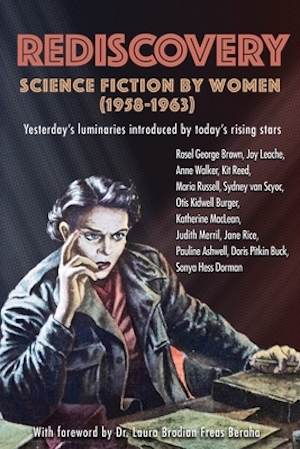
It’s curious that even when women have been active in a field (such as SFF) from the very beginning, whether as founders, creators, or fans, they are so often expunged from the narrative when it’s time to compile Best Of anthologies, Grand Master lists, and histories (whether fan or academic). Hugo-winning novels by women seem to easily fall out print (try buying a recent edition of Cyteen these days). One can only speculate why this might be…
A few anthologists have resisted the erasure. Which is why we have Rediscovery: Science Fiction by Women (1958 – 1963) and its sequel Rediscovery, Volume 2: Science Fiction by Women (1953 – 1957). The anthologists did not take the easy path of reprinting the handful of well-known SF stories by women that had previously been praised, awarded, and anthologized. The editorial team and its contributors painstakingly located and combed through a massive quantity of out-of-print and often obscure material to select and produce two volumes of noteworthy SF that had never received its due.
The Year’s Best African Speculative Fiction (2021): Volume One edited by Oghenechovwe Donald Ekpeki (2021)
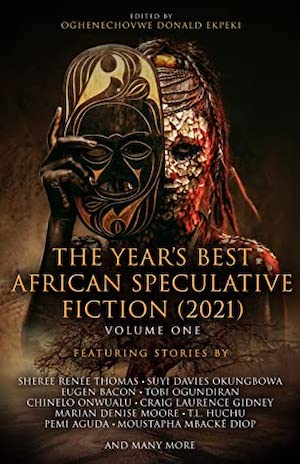
It’s not especially surprising that as far back as Everett F. Bleiler & T. E. Dikty, “Best of SF” anthologies of the past have tended to be rather…demographically focused, shall we say. Fiction created by persons outside that default demographic are poorly documented, particularly if said persons were not North American or British.
Oghenechovwe Donald Ekpeki’s The Year’s Best African Speculative Fiction (2021): Volume One is the debut of what one hopes is a long-running series showcasing current voices in African speculative fiction. Nommo Award-winner Ekpeki presents twenty-nine stories by African and African diaspora authors, some of whom may be known to Tor.com readers and some who will be new. He has drawn on a pool of authors who were published across multiple continents. In a genre previously content to rely on colonial perspectives (where Africa is concerned…among other places), this anthology is a development long overdue.
***
Reprint anthologies being as well-established and popular as they are, readers no doubt have their own favourites not mentioned above. Feel free to enlighten us on the works unmentioned in the comments below.
In the words of fanfiction author Musty181, prolific book reviewer and perennial Darwin Award nominee James Davis Nicoll “looks like a default mii with glasses.” His work has appeared in Publishers Weekly and Romantic Times as well as on his own websites, James Nicoll Reviews (where he is assisted by editor Karen Lofstrom and web person Adrienne L. Travis) and the 2021 and 2022 Aurora Award finalist Young People Read Old SFF (where he is assisted by web person Adrienne L. Travis). He is a four-time finalist for the Best Fan Writer Hugo Award, and is surprisingly flammable.










